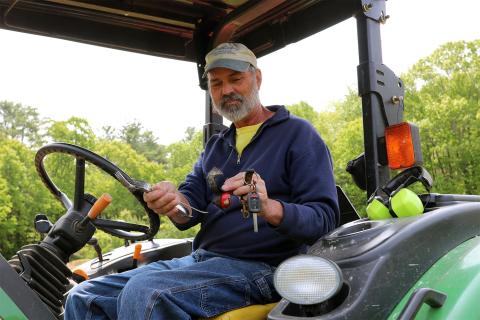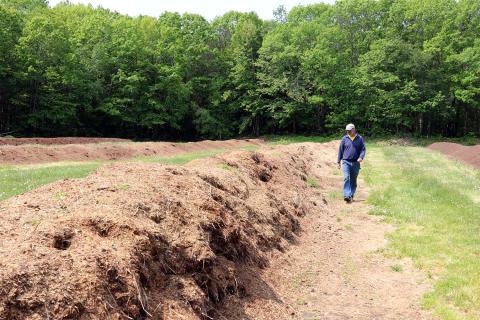
Following high school, Evan Ford ’96 served in the U.S. military, during which time he was stationed in Korea and the Philippines. It was in East and Southeast Asia where he witnessed subsistence farmers doing their best to work the land and provide for their families with what they could. This, along with his faith, inspired him to want to give back, to help those in need and to particularly support farmers and work in the industry himself.
“Just being able to help farmers is partly why I chose this path—because I’ve seen how hard they struggle and how difficult the lifestyle is,” said Evan. “I figured I could come here (to UNH) and help support the researchers so that they can provide that applied science to farmers to use in their practices and better support themselves and their families.”
More than two decades later, he’s responsible for managing the logistical components of the research taking place at UNH’s two agriculture and horticulture farms—finding ways to assist research faculty and staff in meeting their study goals.
Position: Farm Manager, Woodman Horticultural Research Farm and Kingman Research Farm
Year began with NHAES: 2001
Previous positions: Graduated from UNH’s horticultural and agronomy program in 1996. Worked on two different farms, helping with dairy operations and growing and harvesting vegetables, prior to joining UNH as a staff member. Started out as the assistant farm manager of Woodman Horticultural Research Farm. In 2015, became the farmer manager of the Woodman Horticultural Research Farm and the Kingman Research Farm.
Learn more
Evan Ford: I served in the U.S. Marine Corps from 1982-86. I served on Okinawa Island and in Korea and the Philippines, and when we were there, we traveled on buses, occasionally through the countryside. I saw how people were living there, just scraping by at the time, through subsistence farming. It motivated me to help farmers to have better lives.
After I came back to the States, I worked in construction for 8 years, then decided to return to school and earn my degree in horticulture. Around that time, I became a Christian too and decided I wanted to serve humanity. Farming offered that opportunity, as did my faith and missionary work.
Where have you done missionary work at?
Evan: The Dominican Republic and Haiti. I’ve done a little farming work on my missionaries, but mainly more helping with the construction of new buildings.
How do you support research at UNH’s two horticulture/agriculture farms?
Evan: A researcher will usually come to me with a project in mind and my team and I will figure out a way to accomplish their goal(s). We mostly support infield (farmland) research, so we mainly figure out fertility requirements, irrigation systems, field preparation—everything required to keep their plants healthy and alive so that they can attain their research goals. In the summer, I interact with the researchers on a regular basis, identifying their needs and helping solve any problems that might arise.


At the Kingman Research Farm, Evan Ford shows some of the items he's found while out mowing over the years (left) and walks a row of composting material.
What are your favorite parts of the job here at UNH?
Evan: I get to the sample the research byproduct—that’s a big one (laughing). Also, my office is the outdoors. That’s really important to me—I’ve always worked outdoors, throughout my career. Plus, there’s a certain amount of autonomy. And really supportive leadership.
What’s an important attribute of the horticultural and agricultural research taking place at UNH?
Evan: It’s flexible and responsive to what the state and regional needs are. That’s why we’re here—to respond to and meet those needs and to help our farmers, growers and producers.
Is there research that you think we should be looking toward?
Evan: We’ve had some impactful agriculture and horticulture research come out UNH over the years. Two research areas with long and established histories are apple disease and cucurbits research—the latter of which is still going strong.
Looking toward the present and future, another area—and something I think is really important—is season extension. For the sake of farmers across Northern New England, any way that we can find to extend the season—either earlier or later—will be extremely valuable to them.
Do you have your own farm at home and what are some of your favorite things to grow there?
Evan: Yes, I have a few high tunnels at home that I grow in. I used to grow and market my own tomatoes.
I like growing tomatoes and potatoes. I like trying different crops too to see what grows best for me. I like growing blueberries—it’s one of my favorite fruits, plus they’re easy to care for.